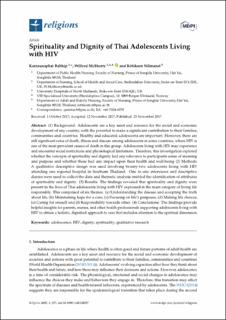| dc.contributor.author | Balthip, Karnsunaphat | |
| dc.contributor.author | McSherry, Wilfred | |
| dc.contributor.author | Nilmanat, Kittikorn | |
| dc.date.accessioned | 2024-04-05T09:03:55Z | |
| dc.date.available | 2024-04-05T09:03:55Z | |
| dc.date.created | 2018-02-07T10:53:13Z | |
| dc.date.issued | 2017 | |
| dc.identifier.citation | Religions. 2017, 8 (12), Article number: 257, 1-18 | en_US |
| dc.identifier.issn | 2077-1444 | |
| dc.identifier.uri | https://hdl.handle.net/11250/3125015 | |
| dc.description.abstract | 1) Background: Adolescents are a key asset and resource for the social and economic development of any country, with the potential to make a significant contribution to their families, communities and countries. Healthy and educated adolescents are important. However, there are still significant rates of death, illness and disease among adolescents in some countries, where HIV is one of the most prevalent causes of death in this group. Adolescents living with HIV may experience and encounter social restrictions and physiological limitations. Therefore, this investigation explored whether the concepts of spirituality and dignity had any relevance to participants sense of meaning and purpose and whether these had any impact upon their health and well-being
(2) Methods: A qualitative descriptive design was used involving twenty-two adolescents living with HIV attending one regional hospital in Southern Thailand. One to one interviews and descriptive diaries were used to collect the data and thematic analysis enabled the identification of attributes of spirituality and dignity.
(3) Results: The findings revealed that spirituality and dignity were present in the lives of Thai adolescents living with HIV expressed in the main category of living life responsibly. This comprised of six themes: (a) Understanding the disease and accepting the truth about life, (b) Maintaining hope for a cure, (c) Focusing on life’s purposes, (d) Making life choices, (e) Caring for oneself and (f) Responsibility towards other.
(4) Conclusions: The findings provide helpful insights for parents, nurses, and other health professionals supporting adolescents living with HIV to obtain a holistic, dignified approach to care that includes attention to the spiritual dimension. | en_US |
| dc.language.iso | eng | en_US |
| dc.publisher | MDPI | en_US |
| dc.rights | Navngivelse 4.0 Internasjonal | * |
| dc.rights.uri | http://creativecommons.org/licenses/by/4.0/deed.no | * |
| dc.subject | qualitative research | en_US |
| dc.subject | spirituality | en_US |
| dc.subject | dignity | en_US |
| dc.subject | HIV | en_US |
| dc.subject | adolescence | en_US |
| dc.title | Spirituality and dignity of Thai adolescents living with HIV | en_US |
| dc.type | Peer reviewed | en_US |
| dc.type | Journal article | en_US |
| dc.description.version | publishedVersion | en_US |
| dc.rights.holder | © 2023 by the Author. Licensee MDPI, Basel, Switzerland | en_US |
| dc.source.pagenumber | 1-18 | en_US |
| dc.source.volume | 8 | en_US |
| dc.source.journal | Religions | en_US |
| dc.source.issue | 12 | en_US |
| dc.identifier.doi | 10.3390/rel8120257 | |
| dc.identifier.cristin | 1562680 | |
| dc.source.articlenumber | 257 | en_US |
| cristin.ispublished | true | |
| cristin.fulltext | original | |
| cristin.qualitycode | 1 | |

